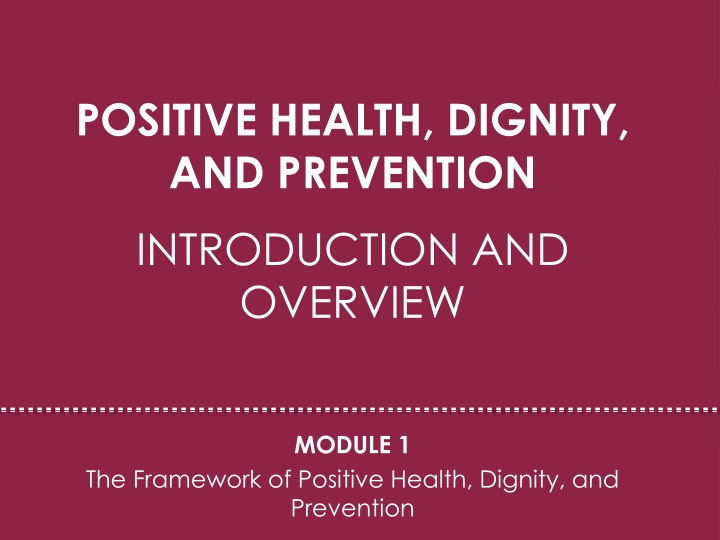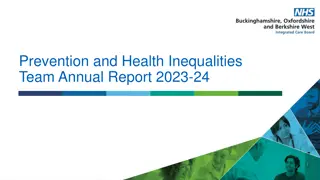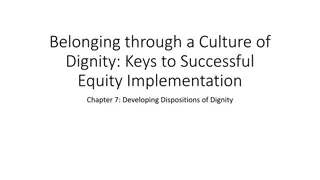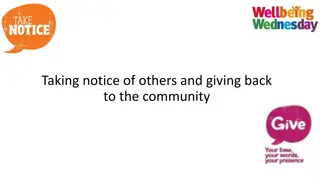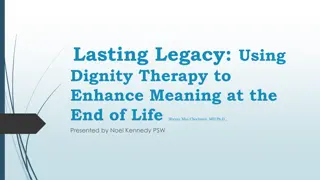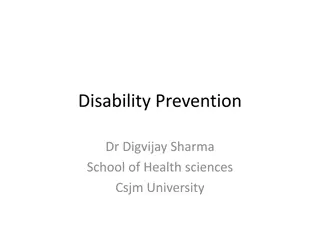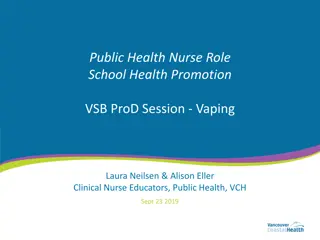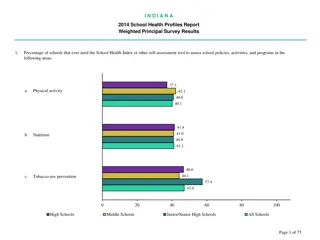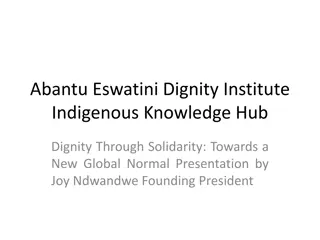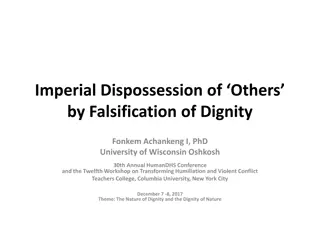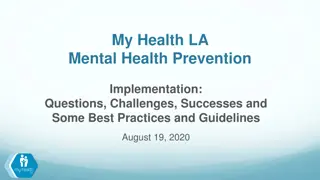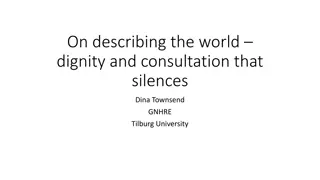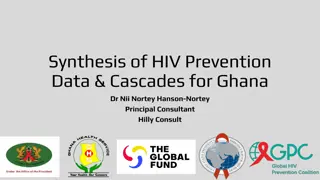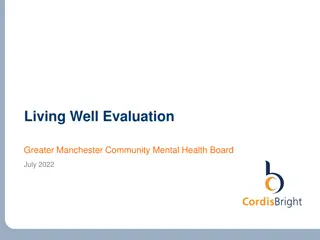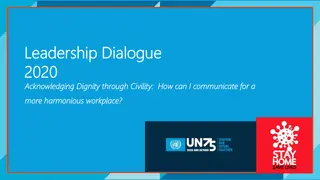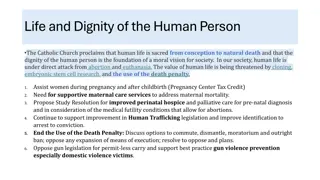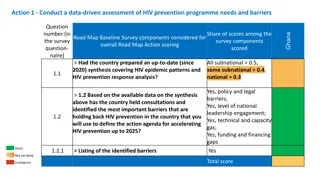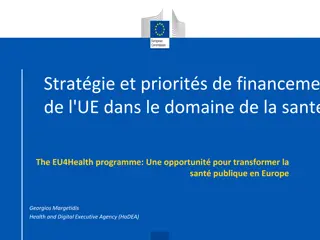Positive Health, Dignity, and Prevention Overview
Positive Health, Dignity, and Prevention (PHDP) is a framework that focuses on improving the lives of people living with HIV through positive health, dignity, and prevention strategies. This approach is rooted in human rights and led by individuals with HIV, aiming to support their well-being and sense of self-worth while also benefiting public health outcomes. The PHDP policy framework emphasizes the involvement of people living with HIV in the HIV response, equipping them with essential information and skills, and addressing legal and structural barriers to health and dignity.
Download Presentation

Please find below an Image/Link to download the presentation.
The content on the website is provided AS IS for your information and personal use only. It may not be sold, licensed, or shared on other websites without obtaining consent from the author.If you encounter any issues during the download, it is possible that the publisher has removed the file from their server.
You are allowed to download the files provided on this website for personal or commercial use, subject to the condition that they are used lawfully. All files are the property of their respective owners.
The content on the website is provided AS IS for your information and personal use only. It may not be sold, licensed, or shared on other websites without obtaining consent from the author.
E N D
Presentation Transcript
POSITIVE HEALTH, DIGNITY, AND PREVENTION INTRODUCTION AND OVERVIEW MODULE 1 The Framework of Positive Health, Dignity, and Prevention
A strategy that encompasses the three main areas on which the improvement of the lives of people living with HIV depends. The three main areas are: 1. Positive health 2. Positive dignity 3. Positive prevention
Positive Health, Dignity, and Prevention (PHDP) is An approach to HIV treatment and prevention with people living with HIV based in human rights and led by people living with HIV. Primary Goal: Support people living with HIV to achieve health and a stronger sense of well-being and self-worth. Corollary Goal: Benefit public health (greater control of the HIV epidemic, reduced HIV incidence, less burden on the health system). Can be downloaded at www.gnpplus.net
Positive Health, Dignity, and Prevention: A Policy Framework Finalised in March 2011 Result of a three-year collective, coordinated process Led by and for Global Network of People Living with HIV (GNP+) Developed with networks of people living with HIV around the world Included input from UNAIDS, donor agencies, public-sector stakeholders Rolled-out to put into practice Updated PHDP (2017) Reflects new global evidence and updated country guidelines Updated with people living with HIV networks and key stakeholders in Jamaica Core modules adapted for health facility and auxiliary worker training
To provide a platform and tools for the greater involvement of people living with HIV in the personal and national response to HIV. To equip people living with HIV with essential information and skills for living emotionally- and physically-healthy lives To provide (clinical and non-clinical) support staff insights on how to best support people living with HIV.
To move beyond positive prevention and prevention with positives. To holistically: Affirm the right to health and well-being, including the importance of addressing treatment and prevention simultaneously. Respond to legal, policy, and other structural barriers to health and dignity. Nurture and enhance leadership of people living with HIV across all areas and levels of programming and policy.
Global framework includes 1. Core values 2. Guiding principles of involvement 3. Programming and policy objectives 4. Nine key areas to strengthen programming . . . plus examples of promising practices
Positive Health, Dignity, and Prevention seeks to: Improve and maintain the health and well-being of people living with HIV. Promote holistic health and wellness. Address psychosocial, economic, educational, and socio-cultural vulnerabilities, as well as gender and sexuality. Respect and be tailored to specific contexts and the diversity of people living with HIV. Help to ensure a supportive and protective legal and policy environment.
Positive Health, Dignity, and Prevention affirms that we need a collective response, with the full engagement of people living with HIV: It is not who you are but what you do. We are all at risk. Having HIV has not made us less than human beings. A human rights approach is the foundation of Positive Health, Dignity, and Prevention. All of Jamaica is responsible for the prevention of HIV. It is a shared responsibility. We deserve a family too. Sexual and reproductive health and rights must be recognised and exercised by everyone, regardless of HIV status.
Positive Health, Dignity, and Prevention aims to: Expand policy and programming approaches that support people living with HIV to make informed choices and live free of stigma, discrimination, and gender-based violence. 1. Scale-up and expand community-owned HIV counselling, testing, care, support, treatment, and prevention programmes that include sexual and reproductive health and rights. 2. Expand literacy programmes related to care, treatment, and human rights. 3. Promote shared responsibility for HIV prevention. 4. Invest in the social capital of organisations/networks of people living with HIV and key populations. 5.
Nine key components are needed to put Positive Health, Dignity, and Prevention into practice: Treatment literacy Empowerment Gender equality Human rights Sexual and reproductive rights Health promotion and access Preventing new infections Social and economic support Meaningful involvement of people living with HIV in measuring impact
Do you still hear (and see) these messages? HIV-positive people should not have sex. HIV-positive people should use condoms or go to prison. HIV-positive women should not have children.
Do you see (and hear) messages like this? What s helped to move towards positive health, dignity, and prevention? What s still needed?
This presentation was collaboratively developed by leaders of the people living with HIV community (Pilot Cohort of the GIPA Capacity Building Project, National HIV/STI Programme, and the Jamaican Network of Seroposities or JNPlus), with support from the Health Policy Project (HPP)/Jamaica. Updates were provided by Health Policy Plus (HPP s follow-on project), in close collaboration with people living with HIV and other key stakeholders in Jamaica.
